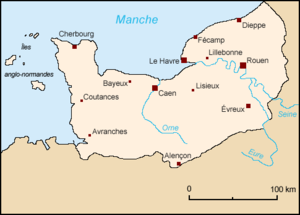Duchy of Normandy: Difference between revisions
No edit summary |
No edit summary |
||
| Line 8: | Line 8: | ||
In 1066 William, commonly called [[William the Conqueror]], or William the Bastard, who was one of the claimants to the English throne, defeated another claimant, and added [[King of England]] to his titles. | In 1066 William, commonly called [[William the Conqueror]], or William the Bastard, who was one of the claimants to the English throne, defeated another claimant, and added [[King of England]] to his titles. | ||
In 1204 France conquered mainland Normandy, but the kings of England continued to reign in the Channel Islands as Dukes of Normandy until 1259, when the Treaty of Paris was agreed between Henry III of England and Louis IX. By this treaty Henry renounced the title of Duke of Normandy and all claims on the mainland parts of the Duchy, while Louis recognized English rule of the Channel Islands. They are now British Crown Dependencies. | |||
Revision as of 04:22, 16 August 2022

The Duchy of Normandy was a political area. It encompassed the Contentin peninsula and most of what is now France's Province of Normandy. To this day, inhabitants of the Channel islands often refer to the Queen informally as "Duke [sic] of Normandy", but this has no legal status.
In 911 Rollo, and Scandinavian leader, during the period of Viking expansion, accepted a grant of land around the mouth and the lower reaches of the River Seine. Vikings had been raiding and settling the coast of France, and the King thought his remaining lands and people would be safer if made a deal with a Scandinavia]]n leader, who would keep out other Scandinavians.
Over the next 150 years the size and strength of the region expanded. The Scandinavian leaders remained focussed around military strength, but adopted some elements of French culture, including the French language.
In 1066 William, commonly called William the Conqueror, or William the Bastard, who was one of the claimants to the English throne, defeated another claimant, and added King of England to his titles.
In 1204 France conquered mainland Normandy, but the kings of England continued to reign in the Channel Islands as Dukes of Normandy until 1259, when the Treaty of Paris was agreed between Henry III of England and Louis IX. By this treaty Henry renounced the title of Duke of Normandy and all claims on the mainland parts of the Duchy, while Louis recognized English rule of the Channel Islands. They are now British Crown Dependencies.